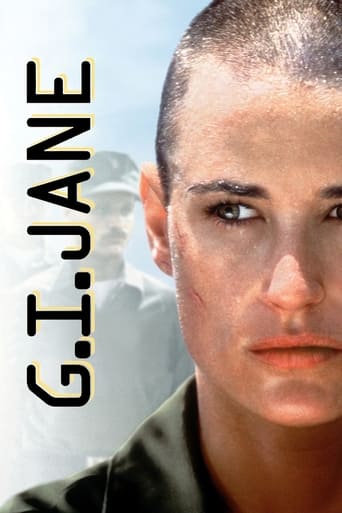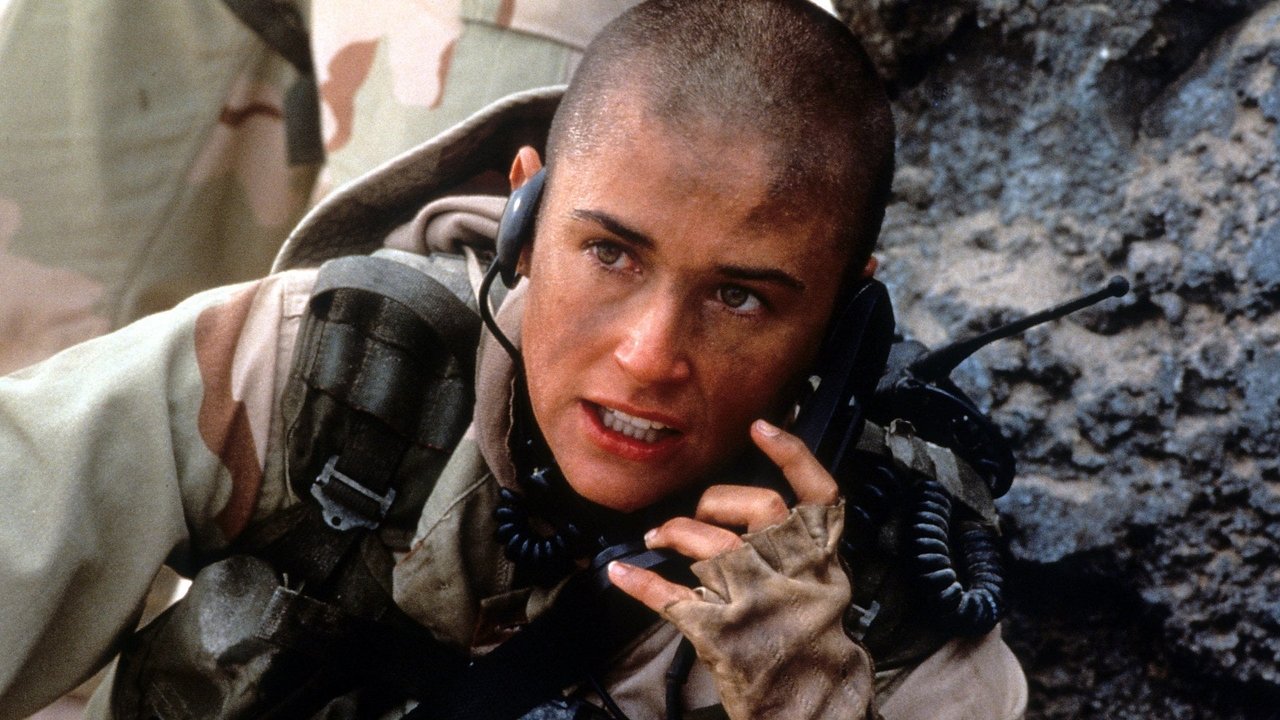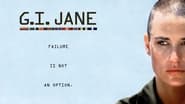kristybs_christian
OK. This movie is amazing. Maybe it's because I've always been curious as to what the Navy Seal training has entailed which looks so grueling. Also, I find military guys really attractive. I am anti feminism. I think this movie is alittle unrealistic in one way. Women are not meant to be in navy seals. Our bodies are just not meant to do what men can do physical wise. With that aside, bad ass movie
FamousGirlfriend
Jordan O'Neill (Demi Moore) is selected to be one of the test subjects in an attempt to explore the possibility to change the policies for women in the navy. Unsurprisingly, there's more than one agenda in the mix.Yes, this is kind of a flat film. Yes: it has flaws. Yes, it's ridiculously predictable. But do I love this film or what? It's one of my dearest feel good films of all time. I think Ridley Scott managed to capture a few real issues in a film that is essentially an amusing and very simple story. The actors do a great job and the story is straightforward, I think it is all it was intended to be.Also, they beat each other up and there are helicopters and explosions.***SPOILERS and annoyingly large wall of text below!***The gender issue is so apparent it might as well be a joke, and in a lot of cases it is! Symbolic references to genitals everywhere. Maybe that's why it works so well. You want the jokes and extreme symbolism. And the helicopters and the violence.There are two powerful women in this film, both of them are trying to make it, but while being a woman is part of the strategy for one of them, being treated as a person rather than a woman is vital for the other. DeHaven is trying to make a feminist statement as part of a (not so clean) political campaign, Jordan just tries to do what she wants in life, despite being a woman.Jordan is victimised and diminished by basically all people around her, DeHaven being the most cruel of them all. At least C.O. Salem is honest. Even her partner is trying to hold her back to some extent, though he comes to respect her decision in the end. But Jordan never considers herself a victim and doesn't for one minute feel sorry for herself. There is just critique and hopeless idiocy in a lot of the characters' reasoning: 1) Women in combat isn't a yes/no decision, because it IS true that men tend to become more protective towards women, and that IS problematic in a war situation (I just read a book on this, so I feel comfortable stating this). Ideology and reality have a tendency to clash. But this doesn't mean that we can't change this: by the time this film came out the policies for women were different from they are now, so apparently we are getting somewhere. 2) There is always someone who decides what is and what isn't politically correct, and while striving for equality, what is important and what is just for show? Does forcing "gender education" upon someone really make a difference or is it just antagonising? Even if I thoroughly dislike the character C.O. Salem and all his opinions, I get where he's coming from and it's not only the 50s.How can we strive for equality when there are still people using their gender as justification or means to succeed? How can we look past "gender norms" when we are the ones upholding and creating them? And why are people not judged by what they bring to the table, when that should be the only thing that matters?
Uriah43
This movie is proof that in Hollywood all things are possible. I say this because it was quite obvious that whoever wrote this film obviously had one goal in mind and that was to present a political opinion that pandered to a certain audience without regard to actual reality. But bending reality completely out of shape has been a trend for a long time in Hollywood and since it sells tickets I imagine it will continue for some time to come. That said, I suppose I shouldn't argue with success regardless of how silly the story gets. At any rate, Demi Moore plays "Navy Lieutenant Jordan O'Neill" who has applied for SEAL training but has been turned down. She laments that because some of her male counterparts have succeeded that they are being promoted ahead of her. Apparently there are no other tough courses in the entire Navy for her to excel. Fortunately, as luck would have it "Senator Lillian DeHaven" (Anne Bancroft) also laments the fact that women aren't given equal opportunities in the Navy and so Lt. Jordan O'Neill suddenly has her big chance. Quite naturally, she not only survives the course (which has many men falling by the wayside due to the physical and mental strain) but she also becomes the leader of her squad due solely to her will to succeed. Not only that, but she is so extraordinary that we see her helping men through the obstacle course along with rejecting all "gender norms" as well. Naturally, towards the end of the film she even manages to save her instructor "Master Chief John James Urgayle" (Viggo Mortensen) while on assignment in Libya. Again, only in Hollywood. Now, normally I would rate a film as ridiculous as this the worst possible score. But it does have some good action scenes and I like Demi Moore. But even so, unless you really need some laughs, totally enjoy feminist propaganda or are completely naive, I wouldn't bother with this one.
david-sarkies
The first thing that I heard about this movie was that the US Navy was opposed to making it and was very resistant to allowing Scott to use any of their facilities. I don't know what happened in the end but they seemed to be using some pretty hi-tech weaponry. One just doesn't walk down to a corner store and buy an Apache, though I thought the Apache was being used very ineffectively in the situation. Basically the Navy Seals were being pursued by a Lybian border patrol and they were on foot, so the Apache was firing missiles. I would have used the chain gun because it is much more effective against infantry than missiles, missiles are for tanks and other vehicles.G.I. Jane is a protest movie and it is about women in the military in front line jobs. The Navy Seals are said to be the best of the front line troops and thus we focus on this. The movie is much more political and deals a lot with the political ramifications of what is going on. The biggest protest here is that nobody wants to bring women home in body bags. What the women say is that they can do anything that a man can do, so if a man can be a front line soldier, then a woman should be as well. Starship Troopers actually has women as front line soldiers. We see the main character wanting to be treated like all the other men, but at first she is given help because they feel that she needs it. What she doesn't want is to be treated any differently. The is opposition to what she is doing but it doesn't come out as strong as it did in the previews. In the previews we are led to believe that everywhere she goes she faces opposition, but this is not true. People do try to persuade her from doing it, but she is stubborn and continues.It is the political side of the movie that draws the criticism. The politicians say that they don't want women coming home in body bags. The whole idea is about change and people don't want to do it. Feminisim is a very strong force in today's society and now we are moving further into what originally were male only jobs. Today we see women weightlifters and labourers, but we still don't see women soldiers. In Australia we have women on the naval ships but not in infantry. Now, in this movie, we see the beginnings of a protest against this.The movie itself was a little confusing at times because the characters seem to mumble and it was hard to concentrate with Louisa and Melissa doing their usual girly things behind me, but that was not Ridley Scott's fault. His dark, wet style is very evident here, though it is quite different to Burton's style. Scott focuses more on this protest, and his darkness is much more realistic. Scott seems to keep the movie dark as a symbol of this world where women are not free to do what they like. Scott also seems to like rain because it is raining a lot in this movie. This seems to symbolise the struggle that the soldiers are going through in the training.The training is very hard, and Scott reminds us of this constantly. They eat from bins and go through training to handle torture and capture. They are beaten up, drowned, and pushed to the limit. They say that there is a 60% dropout rate, and most of them want Jane to do it, but she doesn't. She makes it through a large part of the course only to become a political embarrassment.



 AD
AD









